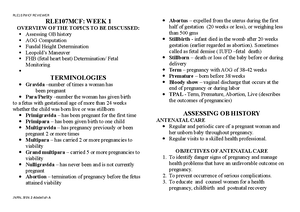- Information
- AI Chat
Was this document helpful?
Psychosocial changes of older adults
Course: Theoretical foundation of nursing (TFN1)
78 Documents
Students shared 78 documents in this course
University: Riverside College
Was this document helpful?

PSYCHO-SOCIAL CHANGES OF OLDER
ADULTS
NCM114COP
BSN 3 - Ray | MS. Ma. Leah Bee Ayson | SEM 2 2023
COGNITIVE ABILITIES AND AGING
● Perception, cognitive agility, memory
and learning
PERCEPTION
● The ability to interpret the environment,
depends on the acuteness of senses
If senses are impaired
⬇
The ability to perceive the environment & react
appropriately is diminished
● Changes in the nervous system affect
perceptual capacity
● Brain losses mass, blood flow to the
brain decreases
COGNITIVE AGILITY
● Mental capability involving reasoning,
problem solving, planning, idea
comprehension
● In older adults, cognitive abilities are
more often a difference in speed than
in ability
● Overall, the older adults maintain
intelligence, problem solving,
judgement, creativity and other
well-practiced cognitive skills
● Cognitive impairment that interferes
with the normal life is not considered
part of normal aging, a decline in
intellectual abilities that interferes with
social or occupational functions should
always be regarded as abnormal (seek
medical evaluation)
MEMORY
● Is a component of intellectual capacity
● Sensory memory
○ momentarily perception of
stimuli from the environment
● Short term memory / recent memory
○ memory held in the brain for
immediate use or what one
has in mind at a given moment
○ it also deals with activities or
the recent past minutes to a
few hours
● Long-term memory
○ repository of information for
periods longer than 72 hours
and usually weeks and years
Confabulation
● making stories just to fill in the blanks or
answer
● must verify or confirm information
SEVEN WAYS TO KEEP YOUR MEMORY SHARP
AT ANY AGE
● Keep learning
○ join a book group; play chess
or bridge; write your life story;
do crossword or jigsaw
puzzles; take a class; pursue
music or art; design a new
garden layout
● Use all your senses
○ for example, try to guess the
ingredients as you smell and
taste a new restaurant dish.
give sculpting or ceramics a
try, noticing the feel and smell
of the materials you’re using
● Believe in yourself
○ myths about aging can
contribute to a failing memory
○ people who believe that they
are not in control of their
memory function are less likely
to work at maintaining or
improving their memory skills
and therefore are more likely
to experience cognitive decline
● Economize your brain use
○ take advantage of calendars
and planners, maps, shopping
lists, file folders, and address
Students also viewed
Related documents
- RN Community
- Anaphy LW4 Skeletal System
- Notes Recopy - TFN
- Orlando B3 - This course deals with an intensive study of the selected literary texts from
- Orlando B2 - This course deals with an intensive study of the selected literary texts from
- Orlando B1 - This course deals with an intensive study of the selected literary texts from





